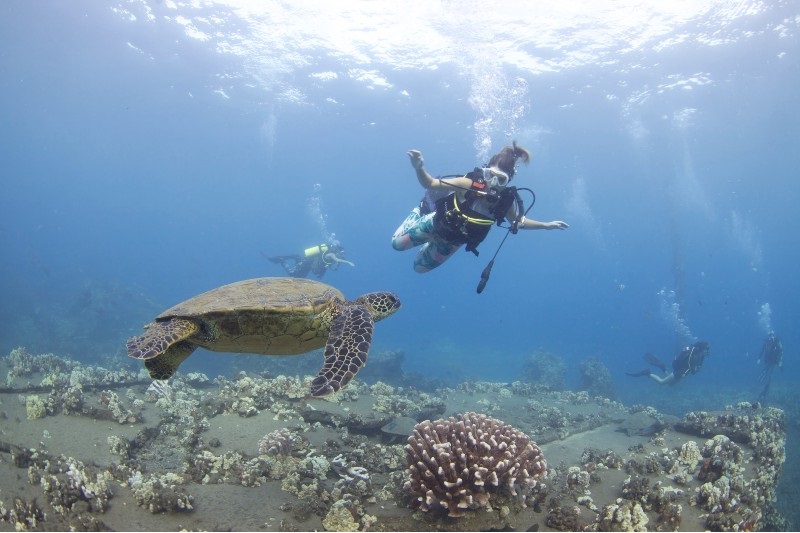Living on Maui and working in the tourism industry gives us unique insights into a few of the problems that can cause hiccups in your diving experience here. Listed below are five quick tips to help our fellow divers make their dive trips to Maui better still!
- Ship your gear over for service before your trip. If you’re going to the difficulty of packing and bringing your gear with you, you’re going to want to actually utilize it, right? And, if you don’t reach use your equipment frequently throughout the year, it’s likely that good that it’ll desire a tune-up, if not really a complete overhaul by enough time you can Maui. Once you’ve inked your travel dates, just give us a call to make certain we’ve got parts for your brand of equipment. Our tech will ask you a few questions and take it from there.
But what about getting the gear serviced at your local shop before your trip? That’s a good idea too, but an even better idea if you’ll have period to dive it before your trip. Our repair tech often hears the words, “but I simply had it serviced before we left for Maui” when divers generate gear that requires some tweaking. As effective as a tech is, gear can sometimes perform differently underwater than it does at the repair bench. While you ship your gear set for service ahead of time, we’ll own it ready for you when you arrive, of course, if it requires another “tweak” after that, we’ll have the ability to handle it for you immediately.
Customers frequently ask us to service their gear by the end of a vacation and then ship it back to them. If your gear is certainly going diving to you soon, then this is fine. If, however, it’s going to go directly to your closet for the next almost a year, you are better off waiting until right before your next visit to own it serviced.
- Don’t bring nutrients to the beach. We believe Maui is a fairly trouble-free spot to visit, but why take a chance? Consider it. Dive sites tend to be a little off the beaten path. Us divers will disappear, out of sight and out of ear shot for approximately an hour. Once a potential theif sees us descend, they could feel they have plenty of time to look at our cars, gear bags, etc.
When I go directly to the dive site, I bring my driver’s license and some bucks “in the event”. My car key doesn’t have any electronics onto it, thus i can actually take it diving. If you have valuables that you would like to keep dry and keep along, consider a small dry pouch of some kind that you can tuck into the wetsuit or BCD pocket. At the minimum, hide things well and do it before you can your destination.
- Make reservations early. We can not stress this one enough. Over and over, we get calls from people who wish to book a referral course for when they reach Maui…THIS weekend! More often than not, we are already booked and have to carefully turn them away. To get more information about, Dive Gear Rental Maui
Solo travelers have better luck than most at getting last second spaces on dive boats, luaus, and zip line tours, but many of these activities have limited spaces every day. If there is an activity on Maui that you truly wish to accomplish, make your reservations well beforehand, anywhere from fourteen days to 8 weeks in advance. This is especially important if you are visiting Maui during one of our peak seasons like Thanksgiving week, Christmas and New Year’s and Spring Break. On Maui, Spring Break runs from March through in regards to a week after Easter every year.
Finally, in case you aren’t coming throughout a peak season, it continues to be best to make your reservations early. Local businesses use the slower times of year to send their employees members on holiday, so availability during those periods may be a little significantly less than usual. Our least favorite thing is to disappoint someone, but it happens for all of us and for for all your other activity businesses whenever we have to turn away last-minute customers.
- When you have unusual needs, arrange for those before your trip too.
What am I talking about here? Guys with size 14 feet, a person who requires a cummerbund extender, a prescription mask, has a difficult-to-fit face, needs ankle weights, needs a medical clearance to dive, and the list goes on. If these connect with you (or you’ve got a different one I haven’t mentioned), you should really purchase and bring these specialized items to you. At the minimum, you should inquire about their availability during booking your dive. Even though you don’t own a complete group of gear, owning specialty items which you know you’ll need will give you satisfaction when traveling and make your dive experience an appropriate one. Though dive shops may have many of these items handy, in addition they seem to be to be the first what to disappear or even to be needed by more than one diver. Don’t let Murphy get you; come prepared.
And back to the mask thing: if you have a heck of a time getting a mask to fit you, once you find that perfect mask, buy two! Murphy’s law dictates that as soon as you get this mask that took you forever to find, it’ll be discontinued, so don’t let Murphy get you!
- If you’re going for a dive class, schedule it for the first part of your trip. Ditto for any special dives you really wish to accomplish. In this manner, if OUR MOTHER EARTH throws some weather at us, we’ll have an improved potential for rescheduling and accomplishing what you want!
